Feeling Grateful For a Full Fridge: On Rationing and the Black Market in WWII Britain
What was it like for British citizens during World War II, when it came to feeding their hungry families? Read and see…and please leave author Anne Clare a comment, as she’s giving away a copy of her debut novel, Whom Shall I Fear to one commenter. I’ve read this book, and it reminded me that there’s ALWAYS more to learn about this tough time in history. Thanks for visiting!
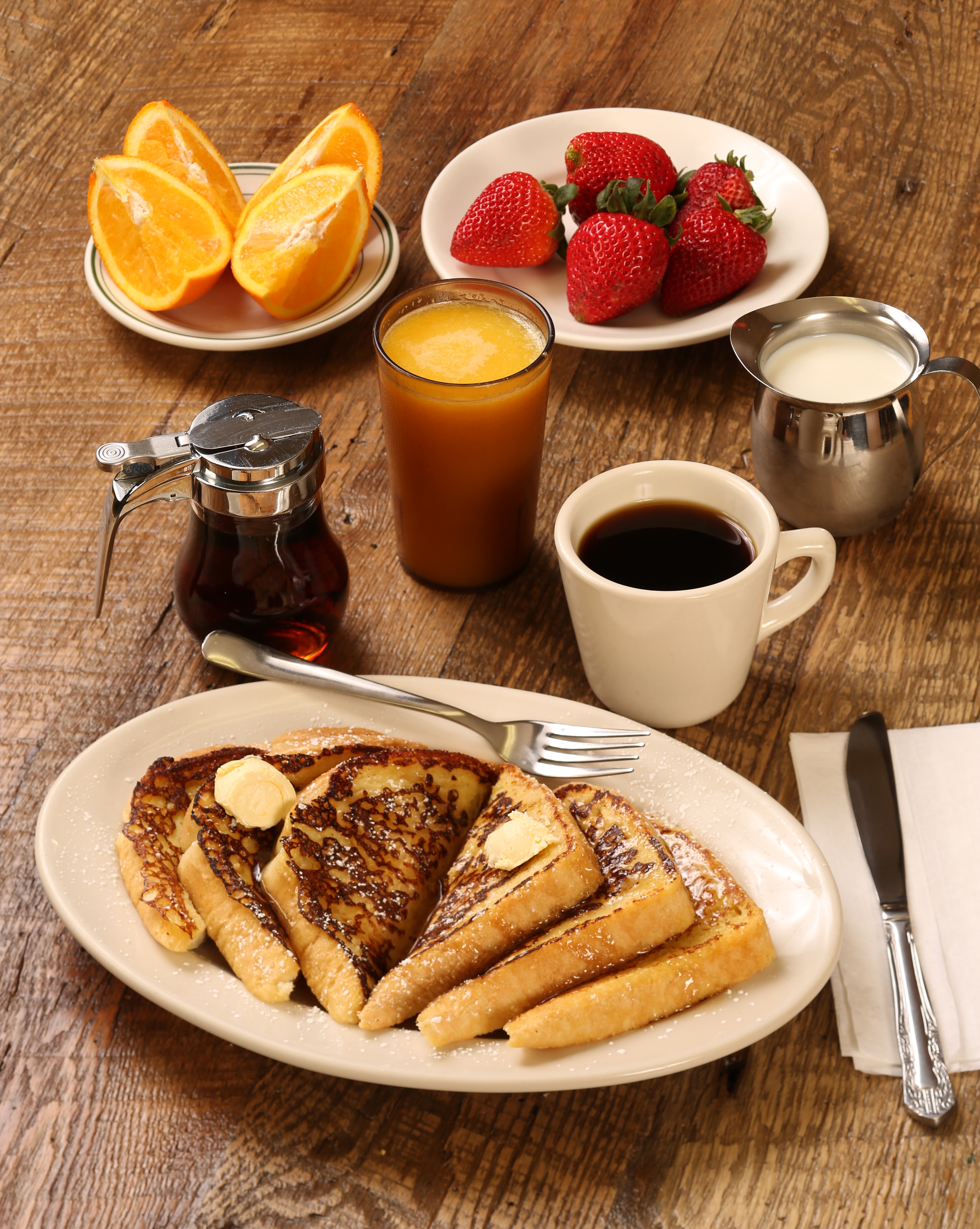
As I’m writing this, it’s Saturday morning, which is “hot breakfast” morning in my family. This morning, I was in the mood for French Toast. I pulled open my fridge and grabbed eggs- there were plenty left from the 18 I’d bought last shopping run. The milk was a little low, but I could just pick up more later. With the cheap loaf of bread I’d picked up on sale yesterday, I was all set!
The steps between “I want this to eat” and “Hey kids, it’s breakfast time!” were so simple that it’s easy to forget that it wasn’t always so.
Before the onset of the Second World War, the island nation of Great Britain had imported around 70% of its food—not to mention other goods—requiringmillionsof tons of shipping.
Then, war broke out.
German U-boat “wolf packs” prowled the Atlantic, blocking shipments, destroying ships, and threatening to starve Britain into submission. How were the British people to be sustained?
The British Ministry of Food enforced a strict rationing program to ensure that there would be sufficient food to go around. Families would register with local sellers to receive their weekly allotments. Lines, or “queues” were long, and families had to plan out how they would use their ration coupons and points from week to week—assuming, of course, that the items they were standing in line for wouldn’t have run out by the time they got to the front.
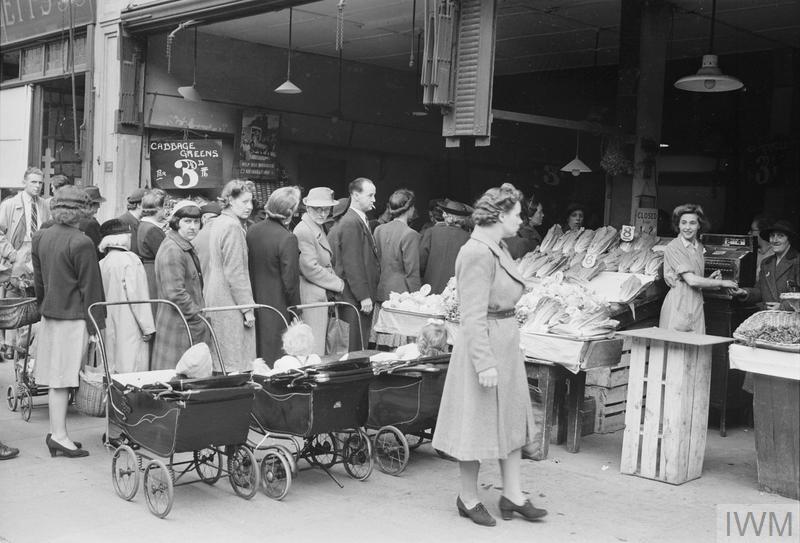
People queuing at a greengrocers in High Road, Wood Green, North London, a familiar wartime sight. © IWM (D 25035)
Kitchen staples like milk, sugar and fat fell under rationing. Average weekly rations for an adult would include 8 oz sugar, 4 oz bacon or ham, 3 pints of milk, 2 oz of tea, and one fresh egg.*
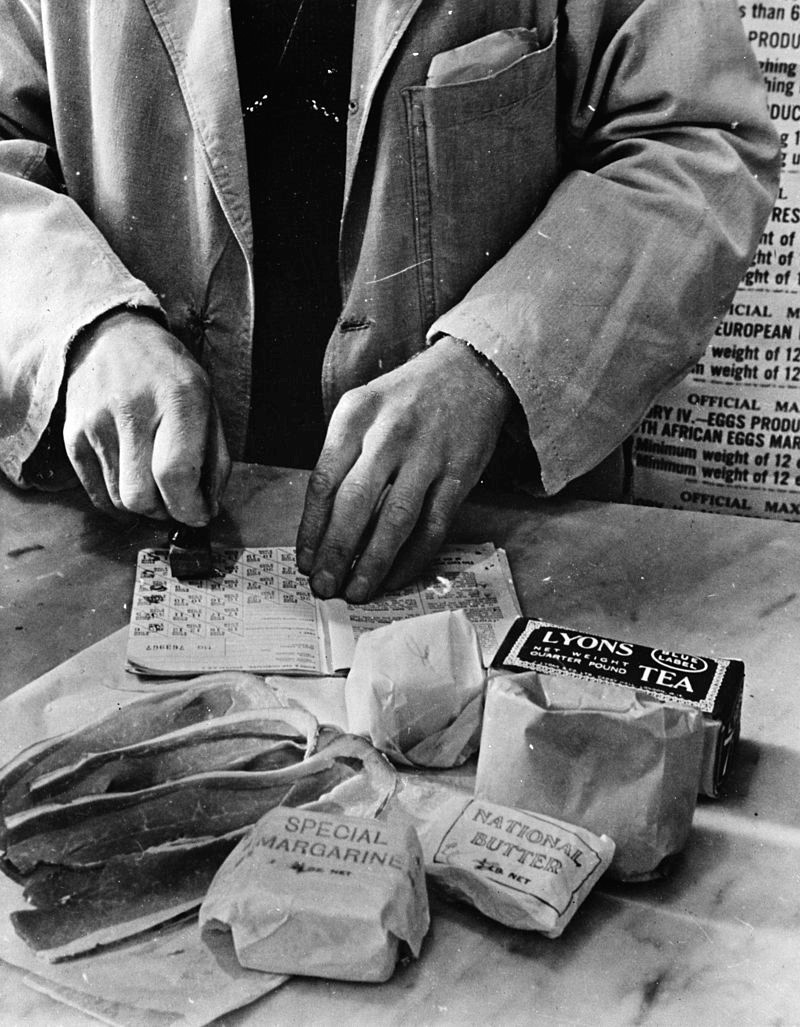
“A shopkeeper cancels the coupons in a British housewife’s ration book for the tea, sugar, cooking fats and bacon she is allowed for one week. Most foods in Britain are rationed and some brand names are given the designation “National”” Photo and caption courtesy of Wikimedia commons.
Non-food items, like clothes, shoes, gasoline and soap, also fell under ration.
However, fruit and vegetables did not, and many people participated in the “Dig for Victory” program, planting gardens in every available bit of soil. Others found clever ways to make up for items they couldn’t get—girls might paint their legs to simulate “stockings” or use beetroot juice to color lipstickless lips.
Some people, however, chose less reputablemeans to supplement their rationed goods.
Illegal activities took many forms. In some cases, it might be as simple as someone “forgetting” to mention that an elderly relative had died and continuing to collect rations with their books. Or perhaps someone might raise chickens but not register the eggs that were produced. In the cities, bombed out buildings were a strong temptation for looters. And, as might be expected, a black market thrived.
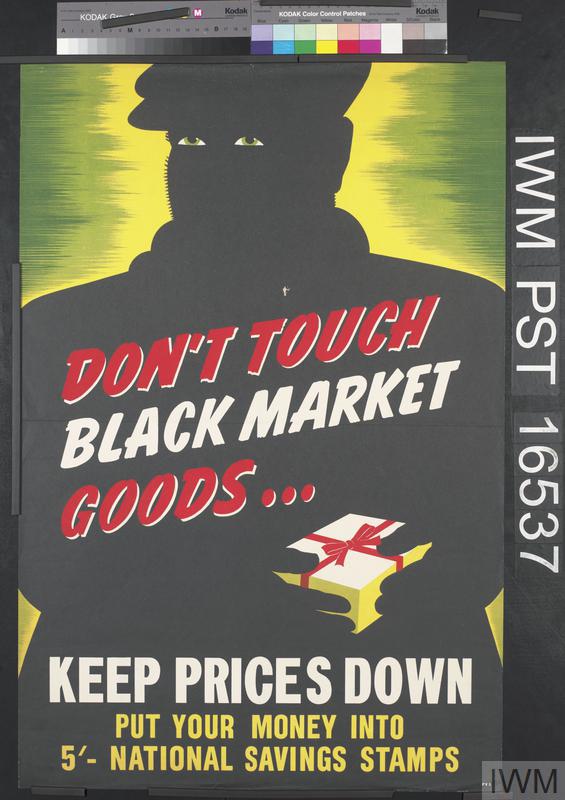
Image courtesy of the Imperial War Museum © IWM (Art.IWM PST 16537)
If someone wanted to find something and couldn’t through legal means, “spivs” had wares to offer, off the books, for a price. Even reputable shopkeepers might have a few things under the counter. As the war dragged on, even people who wouldn’t have considered theft in ordinary times might be tempted to supplement their rations if something that had “fallen off the back of a lorry” just happened to be for sale in their area.
While some steered clear of illegal goods, the temptation was strong—according to the Imperial War Museum, “By March of 1941, 2,300 people had been prosecuted and severely penalized for fraud and dishonesty.” ** And there were still four years of war left to go.
As I was researching all of this for my recently released novel, Whom Shall I Fear?—in which one character finds himself deeply entangled in the underworld of the black market, with dangerous consequences—I found myself newly grateful for the often-overlooked blessings of a fully stocked pantry and grocery stores!
Thank you for letting me visit today, Gail!
For more information, see my sources below, or for fascinating anecdotal stories about Britain’s wartime experiences, check out the BBC People’s War Archives. (http://www.bbc.co.uk/history/ww2peopleswar/)
*Stats taken from the BBC news article “Breaking the Law During World War II” by Duncan Leatherdale ( https://www.bbc.com/news/uk-england-33566789)
**Quote taken from IMW article “What You Need To Know About Rationing In the Second World War” ( https://www.iwm.org.uk/history/what-you-need-to-know-about-rationing-in-the-second-world-war)
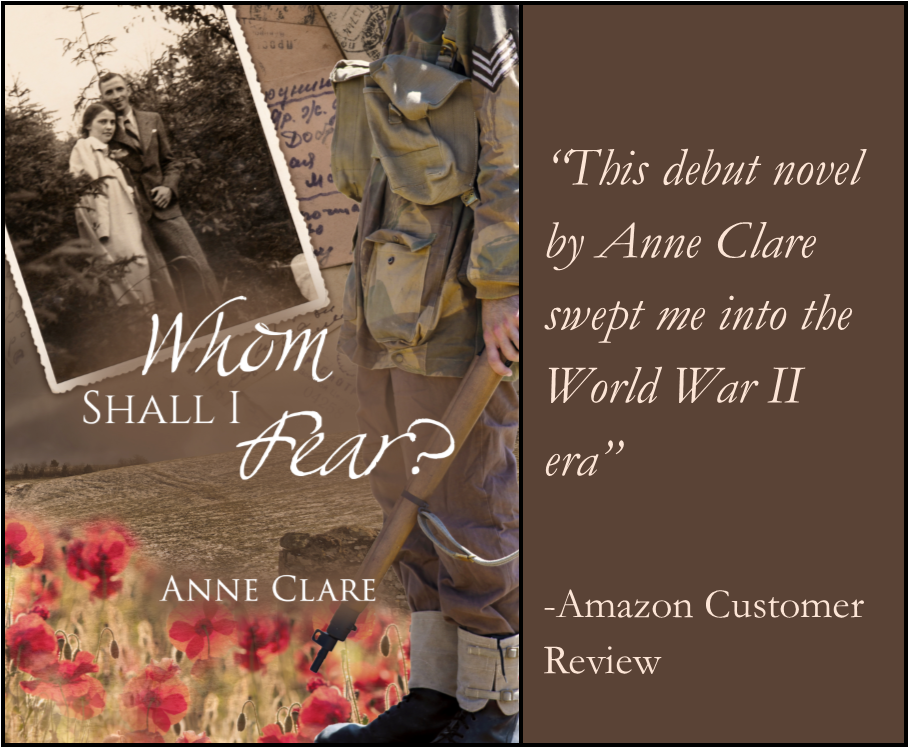
http://thenaptimeauthor.wordpress.com
https://www.facebook.com/anne.clare.1610
Amazon link: https://www.amazon.com/s?k=Whom+Shall+I+fear+anne+clare&ref=nb_sb_noss_2

Pingback: Feeling Grateful For a Full Fridge: On Rationing and the Black Market in WWII Britain
I love these “stories behind the stories.” Thanks for sharing this!
Me too, Joy! Thanks for reading 🙂
Fascinating, but also sad! And it makes me grateful also, for our full fridge and abundance of food! We have so many blessings that we need to not take for granted!
I completely agree, Becky! I’ll admit, once or twice my kids may have been “lucky” enough to get to aaaaalllll about these things when they complained about their food (the dangers of having a mom who likes history!) The real stories are a great reminder of our blessings.
The history of WWII is fascinating to me. It is one of my favorite eras. I remember Daddy telling us what it was like to serve in China, Burma, India. I always want to know more about what it was like for those back home. Thanks for this peek into our past.
It’s a fascinating era, isn’t it? Wow, your father must have had quite the experiences! Thanks for reading 🙂
Perfect choice, Gail. I’ve just started reading Anne’s book and I can already recommend it!!
Aw, thanks GP, and thanks for reading 🙂
Hoping to one day read your book Ms. Anne. Like you and Ms. Gail, I suppose, I’m a bit of history buff. I can remember the rationing of gasoline in the 70s when working at my dad’s service station. I remember sitting behind the shop with a telephone to call police should black marketeers or thieves show up to the precious gasoline from the underground storage tanks. I remember too, my dad opening up the station late and night, with no lights, so our regular customers who needed extra fuel to go back and forth to work could stop and we would quietly pump their gas for them. I looking forward to adding Whom Shall I Fear to my reading list. Thanks for this post.
What a fascinating piece of family history! Ha- the perks of knowing the service station’s owner 😉 Thanks for sharing it, and for reading!
I am always amazed how people can survive through tough times. I was too young during World War II or remember rationing but I often heard the story of how my mother begged and borrowed rationing coupons for tires and gas so she could drive from Medford, Oregon and join my father who was working in San Jose.
Rationing reminds me a bit of my 750 mile backpack trip last summer, Anne. When you have to carry everything on your back, rationing becomes quite real! Of course there were the times whenever I got near a restaurant. There was no rationing then! 🙂 –Curt
Aw, what a neat story- I’m glad she was able to make it work. It was certainly a different time from now, when sometimes it feels like stuff is almost too easily available (from the way it piles up around my house, anyway…)
And I’ll bet, Curt! That photo of your pack and how you had it all sorted out for the trip still amazes me (who stashes snacks to bribe the kids if we’re on a 2 mile hike!)- that was a pretty incredible trip you took! And it only seems reasonable that the restaurant visits would be ‘all you can eat’! 😀
I can’t wait to read her book. My Dad (still alive) was an airmen in England during WWII. When he came home after several years he could not get enough fruits and vegetables. I’m sure, as servicemen, they ate better than the general population but he was SO tired of mutton and potatoes, I don’t think we ever saw a potato on the table until I was a teen. Another story – on the German end of things. My godmother, a devoted Christian, was a young teen in Germany after the war. They were starving as well. A young American military law enforcement officer saw her and was entranced by her beauty. She was only 16 so he asked permission of her father to visit the family and bring fresh venison and other game that he quietly shot and brought to them.It kept them alive. They married before he was sent stateside and were together 70 years.
Thanks so much for sharing your family’s stories- it’s great to remember how fortunate we are with the sheer variety of food available! Loved your godparents story too- so sweet ☺
Please note a frailpresentation for you. http://laifligoson.cf/xem7n
Such a rich history to your story, Anne! And this is indeed a period where illegal/legal slowly becomes “illegal only if one’s caught.” I sure can’t say I’d abstain from buying something that “fell” off the truck if my family needed it. x
Thanks Jean- it’s interesting to think about, isn’t it? I recall one story I came across of an- air raid warden, I think, or other person working on the side of ‘the law’- not turning a lady in when he caught her taking a piece of furniture left behind from a bombed out house, because he admitted that he’d been planning on grabbing it himself… x
Reading about WWII through stories based on history makes me feel extremely blessed. The pay forward option today really started years ago with people helping total strangers during tough times. I am adding your book to my list of must reads!
I agree, Irene! Some of the folks who lived through it even admitted to feeling a little ‘let down’ when the war ended- not because the suffering ended, but because that feeling of solidarity faded. Thanks so much for stopping by!
Loved reading this, Anne. We are so blessed! Thanks for sharing. Hello, Gail.
Thanks so much Gail- we really are, aren’t we? 🙂
Hi Gail and Anne – yes today we are blessed, but if something happens – will today’s populations know what to do … I reckon I do … but many don’t. I remember sweets and ice lollies suddenly becoming available … I guess I was 5 or 6 … My mother was a meat eater, I, as the unborn, was a vegetarian … so more choices of rations were available. We grew veg and at one stage my parents sold parsley – a green herb … we also kept pigs and chickens and geese – except the fox got them! There was barter … but a lot of do-it-yourself … We also walked more and were probably fitter and in some ways healthier if we had land and could grow a few veg – which we did in the country.
Good luck with the book … Cheers – blessed we are indeed … Hilary
Yes indeed Hilary, I’ve wondered that too! Definitely making sure my kids know how to cook a little- and sew, sort of, though I’ve never been a great seamstress 😉
What an interesting piece of family history- thanks for sharing it! I did find it interesting that it sounds as if overall health improved for many people due to rationing, because it made certain that people all got a fair share (like having an allotted milk ration for all children etc.) It’s interesting to see the blessings in the struggles-
And as always, thanks so much for the well-wishes 🙂
Really fascinating and my Mum, who was born in London just after WWII, reported that food remained rationed into the 1950s. Effects of the war lingered for many years for the Brits.
I’m so glad that you enjoyed it! Thank you so much for mentioning the continued rationing- it’s easy to forget that even after the war was ‘over’ it took an awfully long time to get back to normal (though I suppose one could argue that after such a world-shaking conflict, ‘normal’ wasn’t ever going to be exactly the same…)
Thanks for stopping by!
Pingback: Ration Books and Smart Shopping: Stretching U.S. Resources During WWII